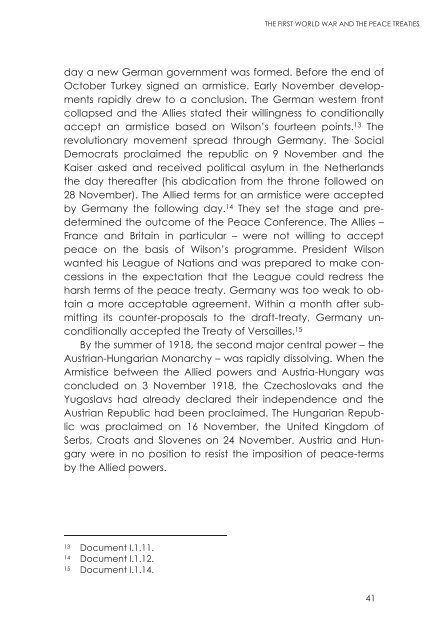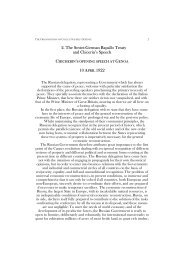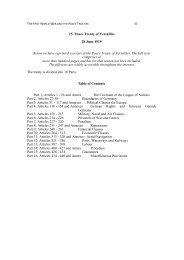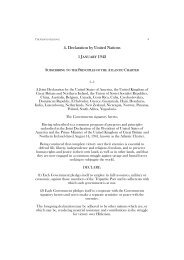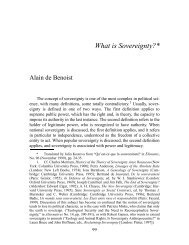CHAPTER 1 THE FIRST WORLD WAR AND THE PEACE TREATIES
CHAPTER 1 THE FIRST WORLD WAR AND THE PEACE TREATIES
CHAPTER 1 THE FIRST WORLD WAR AND THE PEACE TREATIES
Create successful ePaper yourself
Turn your PDF publications into a flip-book with our unique Google optimized e-Paper software.
<strong>THE</strong> <strong>FIRST</strong> <strong>WORLD</strong> <strong>WAR</strong> <strong>AND</strong> <strong>THE</strong> <strong>PEACE</strong> <strong>TREATIES</strong><br />
day a new German government was formed. Before the end of<br />
October Turkey signed an armistice. Early November developments<br />
rapidly drew to a conclusion. The German western front<br />
collapsed and the Allies stated their willingness to conditionally<br />
accept an armistice based on Wilson’s fourteen points. 13 The<br />
revolutionary movement spread through Germany. The Social<br />
Democrats proclaimed the republic on 9 November and the<br />
Kaiser asked and received political asylum in the Netherlands<br />
the day thereafter (his abdication from the throne followed on<br />
28 November). The Allied terms for an armistice were accepted<br />
by Germany the following day. 14 They set the stage and predetermined<br />
the outcome of the Peace Conference. The Allies –<br />
France and Britain in particular – were not willing to accept<br />
peace on the basis of Wilson’s programme. President Wilson<br />
wanted his League of Nations and was prepared to make concessions<br />
in the expectation that the League could redress the<br />
harsh terms of the peace treaty. Germany was too weak to obtain<br />
a more acceptable agreement. Within a month after submitting<br />
its counter-proposals to the draft-treaty, Germany unconditionally<br />
accepted the Treaty of Versailles. 15<br />
By the summer of 1918, the second major central power – the<br />
Austrian-Hungarian Monarchy – was rapidly dissolving. When the<br />
Armistice between the Allied powers and Austria-Hungary was<br />
concluded on 3 November 1918, the Czechoslovaks and the<br />
Yugoslavs had already declared their independence and the<br />
Austrian Republic had been proclaimed. The Hungarian Republic<br />
was proclaimed on 16 November, the United Kingdom of<br />
Serbs, Croats and Slovenes on 24 November. Austria and Hungary<br />
were in no position to resist the imposition of peace-terms<br />
by the Allied powers.<br />
13 Document I.1.11.<br />
14 Document I.1.12.<br />
15 Document I.1.14.<br />
41


